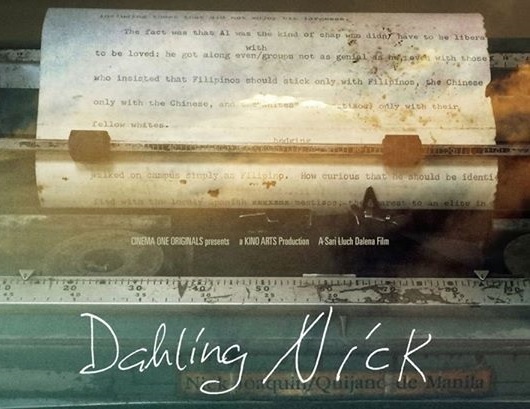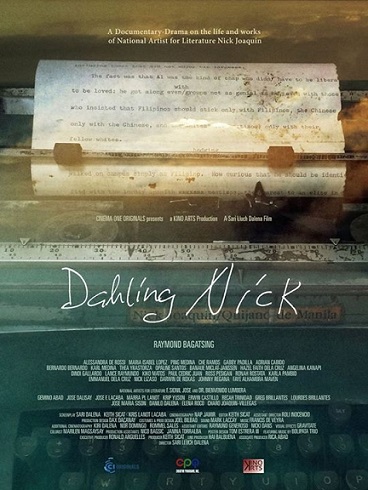The “Nick” in the movie “Dahlin’ Nick,” is the famous Filipino writer, Nick Joaquin.
With a running time of more than three hours, “Dahlin’ Nick,” directed by Sari Dalena with Raymond Bagatsing playing the title role, is many things: hybrid docu-fiction, historical epic, biographical film.
Yet, what makes it stunningly original is its approach to the man and his works; the film is an astounding cinematic critical reading of one of the greatest writers this country has produced.
Joaquin’s much-admired short story “May Day Eve” was adapted into film by Joey Gosiengfiao as the second segment in his three-part “Babae: Ngayon at Kailanman” (1977). Gloria Diaz and Ronaldo Valdez respectively play Agueda and Badoy Montiya, who recount the night they met either each other or a devil and a witch in their likeness.
Gosiengfiao is one of the great masters of cinema, a subversive aesthete whose films are all to often dismissed as “camp” by those who think “camp” only synonymous with frivolity. His “May Day Eve” is a film of surfaces and meticulous visual detail, matching Joaquin’s frenetic sentences with his exquisite choreography. He turns the breathless opening sentence into a dance rivalled only by dances filmed by Visconti.
“May Day Eve” is among the stories adapted by Dalena in “Dahlin’ Nick,” but the differences from Gosiengfiao’s interpretation are stark, and instructive of Dalena’s brilliance both as filmmaker and a reader of literature.
Dalena’s “May Day Eve” gives more weight to mood, shifting from attraction to terror to pain seamlessly like Joaquin did in his story. The seduction between Agueda and Badoy, one of the most romantic scenes in recent films, quickly turn to horror as the narrative jolts to an older Agueda telling her daughter it was the devil who appeared to her on that fateful eve.
Dalena’s film within the film adaptations of “May Day Eve,” and also “The Legend of the Virgin’s Jewel” and “The Two Kisses of Eros,” are themselves amazing cinematic marvels rooted in an almost elemental understanding of the works. She does not stop there.
“Dahlin’ Nick” delves further and makes another great critical reading, wresting Joaquin from the rigidities of his canonization as a “National Artist,” a seemingly innocent honor with a political history that the film demands not to be forgotten.
It was the during the Marcos dictatorship that the title was bestowed to Joaquin, and he accepted it only in exchange for the freedom of an imprisoned friend, Pete Lacaba.
Dalena turns the citation, read in the film by Dindi Gallardo playing Imelda Marcos, against itself. What emerges is a portrait of an artist that dissipates the distinction between art for the sake of art versus political art.
Here is a man from whose works we find lines of immense beauty, like
“Let me arise and follow the river
back to its source: I would bathe my bones
among the chaste rivulets that quiver
out of the clean primeval stones.”
who also confronted a dictatorship when the chips were down.
“Dahlin’ Nick” was shown as part of this year’s Cinema One Originals Festival second week of November. If there’s an opportunity to watch it on any other screening dates, don’t miss it.

